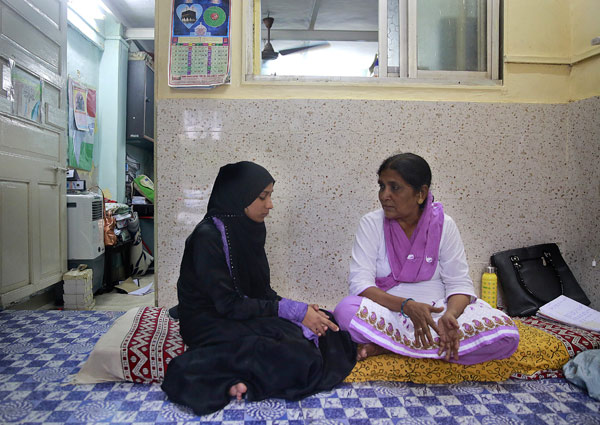Muslim women campaign to end instant divorce
Just hours after Shagufta Sayyd was married, her new husband told her he was having a relationship with another woman.
He was clear the two would have no future, the 21-year-old Sayyd said. He was only marrying her to please his mother.
"He said, 'no, I don't want to keep you,'" she said. "So he said, 'divorce, divorce, divorce, three times, and that was it."
Sayyd still insists on using her husband's surname, until she can end the marriage officially in an Indian court. But like many other women from India's large Sunni Muslim minority, her fate and status are governed by Muslim Personal Law that follows the tenets of the Islamic faith, as interpreted by local imams and religious schools across India.
The so-called triple talaq, or instant divorce, has been banned in more than 20 Muslim countries, including neighboring Pakistan and Bangladesh. But in India, the practice is allowed thanks to the country's rules protecting Muslim, Christian and Hindu communities following religious law.
Most of the 170 million Muslims in India are Sunnis governed by Muslim Personal Law for family matters and disputes. Those laws include allowing men to divorce their wives by simply uttering the word talaq, or divorce in Urdu, three times - and not necessarily consecutively, but at any time, and by any medium including telephone, text message or social media post.
Some women are fed up with what they say is an archaic and patriarchal rule that too often leaves them destitute. Muslim women do not have the same right, and those left by their husbands have no claim to alimony though they can collect a small payment for three months after divorce.
Then, they're on their own.
"They have been divorced by speed post, by sending out letters. Some have just simply said talaq three times and the divorce has happened," Noorjehan Safia Niaz, co-founder of Bhartiya Muslim Mahila Andolan, or the Indian Muslim Women's Movement.
Unconstitutional
The movement has been fighting for equal laws for Muslim women for six years.
"There are cases where women don't even know that they've been divorced," Niaz said. "The children are without any support. So, it has become very convenient for Muslim men to just say talaq thrice and. it is just so easy for him to get the woman out of his life."
Legal experts say the practice is unconstitutional, and the Supreme Court has been pushing for uniformity in laws. In 1985, the top court ruled ordered a man to pay alimony to his elderly wife, after verbally divorcing and abandoning her.
The Indian government in office at the time, however, managed to overturn the verdict retroactively by passing a law to protect Muslim divorce law. Many suspect the government was under pressure from Muslim leaders to stay out of their business or lose their electoral support.
The move frustrated women's rights activists. India had long since banned dowry payments from a girl's parents to the family of a groom before marriage, though many still practice the ancient Hindu tradition openly, they note. And more recently, India threw out Hindu laws that barred women from inheriting property from their fathers.
What makes the instant divorce laws so difficult, some say, is the fact that they are not codified and so are open to interpretation and adjustment.
One Supreme Court lawyer called the practice "barbaric."
"This is a kind of an ISIS-like rule prevailing in India," the advocate, Monika Arora, said, referring to the militant Islamic State that controls much of Syria and Iraq. "No progressive country can tolerate this."
|
 Shagufta Sayyd, left, listens to Khawtoon Shiekh, an activist with the Indian Muslim Women's Movement, at their office in Mumbai, India. Shagufta is among the Indian Muslim women against an Islamic legal practice that allows men to divorce their wives by simply saying "I divorce you" three times. Rafiq Maqbool / Ap |


















